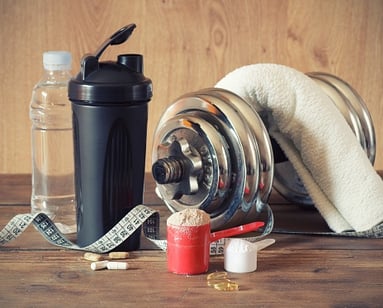Most of us have specific goals in mind when it comes to an exercise program. We work hard to achieve these results day in and day out, but sometimes our bodies may need an extra push to get over that hump. Many people question the importance of adding supplements to a healthy diet and workout routine, as well they should.
 With so many different supplements flooding the shelves these days, it’s hard to know which ones will truly help you achieve your desired results. Although I agree that some supplements might not be necessary to include in your program, others could be beneficial to many individuals no matter what their fitness goals are.
With so many different supplements flooding the shelves these days, it’s hard to know which ones will truly help you achieve your desired results. Although I agree that some supplements might not be necessary to include in your program, others could be beneficial to many individuals no matter what their fitness goals are.
Not a Substitute for Proper Nutrition
Before I go any further, I want to note that supplementation is simply an addition to your diet and exercise regime. These are not meant to replace a well-balanced whole-food diet; they are meant to be used in conjunction.
Most of the nutrients we need are already being produced by our own bodies to a certain extent, as well as existing in foods we eat daily. Some essential nutrients such as protein, creatine, and branched-chain amino acids (BCAAs) are naturally produced in the body and can be found in meat products, including (but not limited to) red meat, fish, and ground turkey. These amounts are just large enough to support daily functioning, but may not be produced in large enough quantities to aid in dramatic physique enhancements. If you are looking to take your physique to the next level, supplementation might be just what you need.
Which Ones Should I Use?
Here are the top five supplements (in my opinion, and that of many top professionals) you could add to your exercise and diet program.
- Branched-chain amino acids (BCAAs): BCAAs are essential nutrients that help the body slow down protein and muscle breakdown, which can aid in preventing muscle fatigue during intense workouts. It works by stimulating the building of protein in muscles, which in turn helps prevent muscle breakdown. I would not recommend using BCAAs when trying to gain muscle hypertrophy (or size), as muscle breakdown is essential for muscle growth. Instead, try a pre-workout or caffeinated drink before your workout for extra energy.
- Creatine: Creatine is an organic acid that is produced in the liver and helps supply energy to cells all over the body (especially muscle cells). People take creatine because it allows the body to produce more energy, and with more energy a person is able to increase the intensity of their workouts. Many athletes use creatine to improve their overall performance. It also helps aid in quicker muscle recovery after an intense workout.
- Protein: Your muscles need protein grow and recover from muscle breakdown caused by exercise. You can get plenty of protein in your diet; however protein shakes are generally lower in calories than a high-protein meal. They are also portable and more convenient that carrying around whole-food meals (here are some ideas for making your own). Two widely used proteins are whey and casein. Whey is a fast-digesting protein that aids in muscle recovery and muscle growth. Casein is a slow-digesting protein that creates a longer-lasting supply of muscle-building nutrients. Many experts recommend taking a mixture of the two proteins to ensure a release of amino acids into the blood for as long as possible, therefore aiding in lean muscle gain as well as body fat decline.
- Multi-vitamins: Multi-vitamins are essential to support the body’s everyday functioning. Your body needs a variety of complex nutrients for optimum efficiency and performance. Taking a high-potency multi-vitamin can ensure your body is getting those essential nutrients to support thousands of metabolic reactions. Here’s more information on the importance of a multi-vitamin for your health and fitness goals, including a list of the essential vitamins and minerals you need.
- Fish oil: Fish oil tablets are the most efficient way to get the purest and most concentrated dose of Omega-3s into your diet. Omega-3s have been proven to improve blood circulation, which in turn will allow nutrients such as protein and carbohydrates to reach muscles. Omega-3s also help with maximizing metabolic rate, which in turn helps with fat loss.
Dietary supplements can have many health benefits as well as many performance-based benefits. If you are not concerned with taking supplements for their potential performance enhancements, you should at least be taking supplements such as multi-vitamins and fish oil tablets for your general health. They can be an easy addition to your diet and exercise regimen that may have huge effects on your overall health. Add supplements on an as-needed basis after conducting a needs analysis, and implement one at a time.
If you have additional questions or concerns about supplementation, please stop by and ask any Health Fitness Specialist at NIFS or contact our Registered Dietitian, Angie Mitchell for more information.
This blog was written by Darius Felix, Health Fitness Specialist at NIFS. To find out more about the NIFS bloggers, click here.

